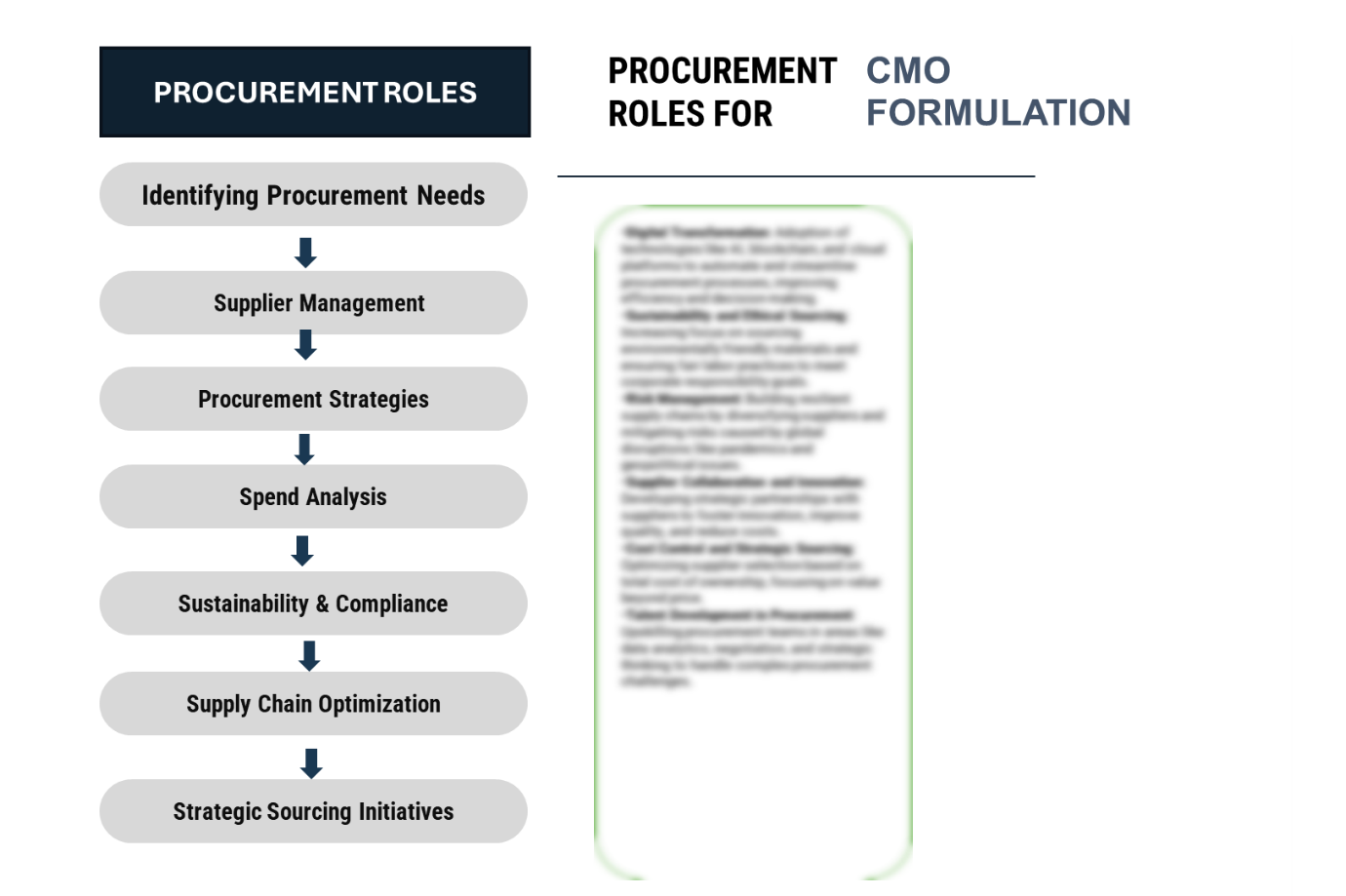Summary Overview
CMO Formulation Market Overview
The global Contract Manufacturing Organization (CMO) formulation market is experiencing robust growth, driven by the increasing demand for pharmaceutical products, especially in biologics and specialty drugs. The market size in 2024 is projected to reach approximately USD 272.4 billion and is expected to grow at a compound annual growth rate (CAGR) of 7.7% from 2024 to 2033. This growth is primarily attributed to the rising need for cost-effective and high-quality manufacturing solutions, particularly for drug formulation and production of active pharmaceutical ingredients (APIs) and finished dosage forms (FDF).
Growth Rate: 7.7%
Key Market Trends and Drivers
Technological Advancements: The adoption of advanced technologies in drug formulation, such as 3D printing, continuous manufacturing, and precision medicine, is enabling more efficient and scalable production processes.
Biologics and Gene Therapy Growth: The expanding market for biologic drugs, including monoclonal antibodies and gene therapies, is boosting demand for specialized CMO services.
Sustainability: There is a growing focus on sustainable practices in the CMO industry, including green manufacturing processes and energy-efficient solutions, which is a key driver in attracting new partnerships.
Digital Transformation: Digital procurement tools and AI are being increasingly integrated into manufacturing operations, improving efficiency, traceability, and cost management.
Growth Drivers
Health Consciousness: The increasing focus on health and wellness among consumers is driving demand for pharmaceuticals that address chronic diseases and conditions.
R&D Investments: Increased investment in pharmaceutical R&D, particularly for biologic and specialty drugs, is creating more opportunities for CMOs.
Global Population Growth: An expanding global population, particularly in emerging economies, is contributing to higher demand for medications and treatments, fueling the CMO market.
Sustainability Outlook
Sustainability initiatives, including the implementation of waste reduction technologies, energy-efficient production systems, and environmentally friendly practices, are becoming integral in CMO operations. These efforts are aligned with global regulatory and consumer demands for greener manufacturing practices.
Market Intelligence for the CMO Formulation Market
Given the complexities of pharmaceutical manufacturing, market intelligence services offer valuable insights into the pricing dynamics, supplier performance, and market trends, enabling stakeholders to make informed decisions and mitigate risks. Procurement strategies such as strategic sourcing and supplier diversification are essential for optimizing costs and ensuring access to high-quality services in this competitive market.
Procurement Intelligence for CMO Formulation Market: Category Management and Strategic Sourcing
In the rapidly evolving CMO formulation market, companies are enhancing procurement strategies to navigate challenges such as rising production costs, regulatory pressures, and increasing demand for complex formulations like biologics and gene therapies. Strategic sourcing and category management have become key to achieving cost-effective procurement while ensuring the timely availability of high-quality formulations.

Pricing Outlook for CMO Formulation Market: Spend Analysis
The CMO (Contract Manufacturing Organization) formulation market is experiencing price fluctuations due to a range of factors, including technological advancements in drug formulation, regulatory changes, and increasing global demand for complex drugs like biologics. This complex pricing environment is driven by market dynamics and the evolving landscape of pharmaceutical manufacturing.
line chart illustrating the pricing outlook for the CMO formulation industry from 2024 to 2032. The chart shows the projected price trends, with prices gradually increasing over the years.
Our analysis highlights the key drivers of price trends in the CMO formulation market:
Technological Advancements: The growing demand for cutting-edge formulations such as biologics, gene therapies, and customized drug delivery systems is driving up the costs of CMO services. These technologies require advanced manufacturing capabilities, which increases overall production costs.
Raw Material Costs: Prices for raw materials, particularly active pharmaceutical ingredients (APIs), continue to fluctuate due to varying supply levels and geopolitical factors. These fluctuations are reflected in the overall pricing for CMO services.
Regulatory Compliance: Increased regulatory scrutiny and evolving compliance requirements add additional costs to the formulation process. This includes investments in quality control, testing, and certification processes to ensure products meet international standards.
Surge in Demand: The global rise in healthcare demands, especially in emerging markets, is leading to increased competition and price pressures in CMO services. Pharmaceutical companies are leveraging CMOs to meet the growing demand for both generic and novel therapeutics.
Environmental Factors: Just as with almonds, climate factors such as supply chain disruptions or material shortages in specific regions can impact the CMO formulation market, especially in areas where high-demand raw materials are sourced.
Cost Breakdown for the CMO formulation Market: Cost saving opportunities
1. Raw Materials and Active Ingredients (50%)
Description: This category includes the costs of raw materials, such as APIs (Active Pharmaceutical Ingredients), excipients, and other necessary components required for the formulation of pharmaceutical or biopharmaceutical products. The cost fluctuates based on the complexity of the product and raw material prices, which can vary due to supply chain conditions or global demand for specific materials.
Trends: The raw materials sector is heavily impacted by global supply chain issues, such as delays in procurement or increased costs from raw material shortages. Recent disruptions in pharmaceutical supply chains, alongside growing demand for specialized treatments, have pushed material costs upward.
2. Labor (XX%)
3. Processing & Packaging (XX%)
4. Infrastructure & Overheads (XX%)
Cost saving opportunity: Negotiation Lever and Purchasing Negotiation StrategiesOptimizing procurement strategies in the CMO formulation market involves several key approaches, including bulk procurement, supplier collaboration, and the use of sustainable manufacturing practices. By negotiating long-term contracts, consolidating suppliers, and outsourcing to low-cost regions, companies can reduce material and labor costs. Additionally, adopting automation and advanced technologies improves production efficiency, while streamlining logistics and supply chains minimizes transportation expenses. Packaging optimization and leveraging third-party logistics can further reduce costs, allowing CMOs to stay competitive and profitable in a dynamic market.

Supply and Demand Overview of the CMO Formulation Market: Demand-Supply Dynamics and Buyer Intelligence for Effective Supplier Relationship Management (SRM)
The CMO formulation market is experiencing steady growth driven by the increasing demand for customized pharmaceutical solutions, the rise in chronic diseases, and the need for personalized medicine. The demand is largely fueled by biotechnology and pharmaceutical companies seeking reliable, cost-effective contract manufacturing organizations (CMOs) to meet production needs for active pharmaceutical ingredients (APIs) and drug formulations.
Demand Factors:
Rise in Chronic Diseases: The increasing global prevalence of chronic conditions, such as diabetes and cardiovascular diseases, drives the need for advanced, tailored pharmaceutical solutions.
Personalized Medicine: As personalized medicine gains traction, demand for CMO formulations that offer customized drug delivery systems and formulations increases.
Regulatory Changes: Stricter regulatory standards for drug production are pushing pharmaceutical companies to collaborate with experienced CMOs that can ensure compliance.
Global Healthcare Expansion: Increased healthcare access in emerging markets is fuelling demand for affordable and efficient pharmaceutical manufacturing solutions.
Supply Factors:
Capacity Constraints: The growing demand for CMO services can strain production capacity, especially for highly specialized formulations, creating potential supply bottlenecks.
Technological Advancements: Innovations in biopharmaceutical manufacturing technologies, such as continuous manufacturing and automation, are improving production efficiency and yield.
Regulatory Compliance: The need for compliance with increasingly stringent quality standards influences supply chain decisions and availability.
Geographical Variability: CMOs in different regions (e.g., India, China, and Europe) experience varying production costs, regulations, and labor availability, affecting supply dynamics globally.
Regional Demand-Supply Outlook: CMO Formulation Market
The CMO formulation market is experiencing rising demand across key regions, driven by the increasing need for pharmaceutical outsourcing, personalized medicine, and global healthcare expansion.
The image shows growing demand for CMO formulation in both North America and Asia, with potential price increases and increased competition
North America: A Key Player in the CMO Formulation Market North America, particularly the U.S., is a dominant region in the CMO formulation market, characterized by:
Leading Contract Manufacturers: The U.S. hosts several prominent CMOs specializing in high-quality pharmaceutical production, offering both large-scale manufacturing and personalized drug formulations.
Robust Healthcare System: A well-established healthcare system and an advanced pharmaceutical sector drive continuous demand for drug production services, particularly for biologics and complex therapies.
Innovation in Drug Development: The U.S. is a hub for pharmaceutical innovation, with advanced drug development and manufacturing technologies leading to demand for specialized CMO services.
Regulatory Compliance: Strict FDA regulations ensure that pharmaceutical production meets high-quality standards, fostering trust in U.S.-based CMOs.
Expanding Export Markets: With pharmaceutical exports growing, North American CMOs are increasingly relied upon to meet the global demand for high-quality formulations.

North America remains a key hub CMO Formulation market and its growth
Supplier Landscape: CMO Formulation Market
The CMO formulation market consists of various key suppliers that provide essential services, materials, and technologies for the manufacturing of pharmaceutical products. These suppliers range from companies specializing in active pharmaceutical ingredients (APIs) and excipients to those providing packaging materials and advanced production technologies. The supplier landscape is becoming increasingly dynamic as pharmaceutical companies turn to CMOs for specialized manufacturing, particularly in biologics, biosimilars, and complex drugs.
Key Suppliers in the CMO Formulation Market:
Lonza Group
Samsung Biologics
WuXi AppTec
Boehringer Ingelheim
Catalent
Fujifilm Diosynth Biotechnologies
Recipharm
Corden Pharma
Piramal Pharma Solutions
Patheon (part of Thermo Fisher Scientific)
Key Development: Procurement Category significant development
Significant Developments |
Description |
Market Growth |
The CMO formulation market is expected to grow as demand for biologics, personalized medicine, and complex drug formulations increases. |
Outsourcing Trends |
Pharmaceutical companies are increasingly outsourcing formulation services to CMOs to focus on core competencies and reduce costs. |
Regulatory Changes |
Stringent regulatory standards, particularly for biologics and biosimilars, are pushing CMOs to enhance their compliance capabilities. |
Technological Advancements |
Advanced manufacturing technologies such as continuous manufacturing and automated systems are improving production efficiency and product quality. |
Sustainability Focus |
Increasing adoption of sustainable practices, such as reducing waste and energy use, is reshaping CMO operations and contributing to cost savings. |
Contractual Partnerships |
Growing number of strategic alliances between CMOs and pharmaceutical companies, particularly in early-stage and clinical trial services. |
Geographic Expansion |
CMOs are expanding their footprints in emerging markets, particularly in Asia, to tap into increasing pharmaceutical production demands. |
E-commerce Integration |
Adoption of digital platforms for easier collaboration, order management, and product tracking between CMOs and clients is becoming more common. |
Procurement Category |
Significant Development |
Impact |
Active Pharmaceutical Ingredients (APIs) |
Advancements in biotechnology and genomics, leading to novel API formulations and complex molecules. |
Increased demand for high-quality, specialized APIs drives CMO partnerships and outsourcing growth. |
Formulation Development |
Shift towards personalized medicine and biologics, requiring advanced formulation expertise. |
Increased need for CMOs with capabilities in complex formulations and scalable production. |
Packaging Materials |
Innovation in packaging, including sustainable, patient-friendly packaging solutions. |
Enhances the supply chain, ensures product stability, and meets regulatory standards. |
Technology & Equipment |
Investment in advanced manufacturing technologies, such as continuous manufacturing and 3D printing. |
Streamlines production processes, reduces costs, and improves product quality and consistency. |
Supply Chain Optimization |
Focus on end-to-end supply chain management and real-time tracking technologies. |
Improves transparency, reduces lead times, and mitigates supply chain disruptions. |
Regulatory Compliance |
Increasing complexity of global regulatory requirements, especially in biologics and biosimilars. |
Drives demand for CMOs with expertise in regulatory affairs and compliance in multiple regions. |
Sustainability Practices |
Growing emphasis on environmentally sustainable practices, including waste reduction and eco-friendly materials. |
Reduces operational costs and meets the rising demand for sustainable pharmaceutical manufacturing. |










